Impact of Lifestyle and Environment on Older Adults in New Zealand
VerifiedAdded on 2020/03/04
|9
|2440
|31
Essay
AI Summary
This essay examines the quality of life of older adults in New Zealand, exploring the various factors that influence their experiences. It delves into the impact of healthy lifestyles, emphasizing the importance of physical activity in mitigating age-related decline and lifestyle diseases. The essay also discusses the significance of socioeconomic and mental health, highlighting the role of income, access to healthcare, and social support in shaping the well-being of older adults. Furthermore, it analyzes the influence of environmental factors, such as housing, transport, and community involvement, on the ability of older people to maintain an active social life. The essay also explores positive life experiences, including the benefits of physical activities, accessible health services, and adequate income, and concludes by emphasizing the multifaceted nature of quality of life for older adults in New Zealand, highlighting the need for comprehensive support systems that address health, social, and economic needs.
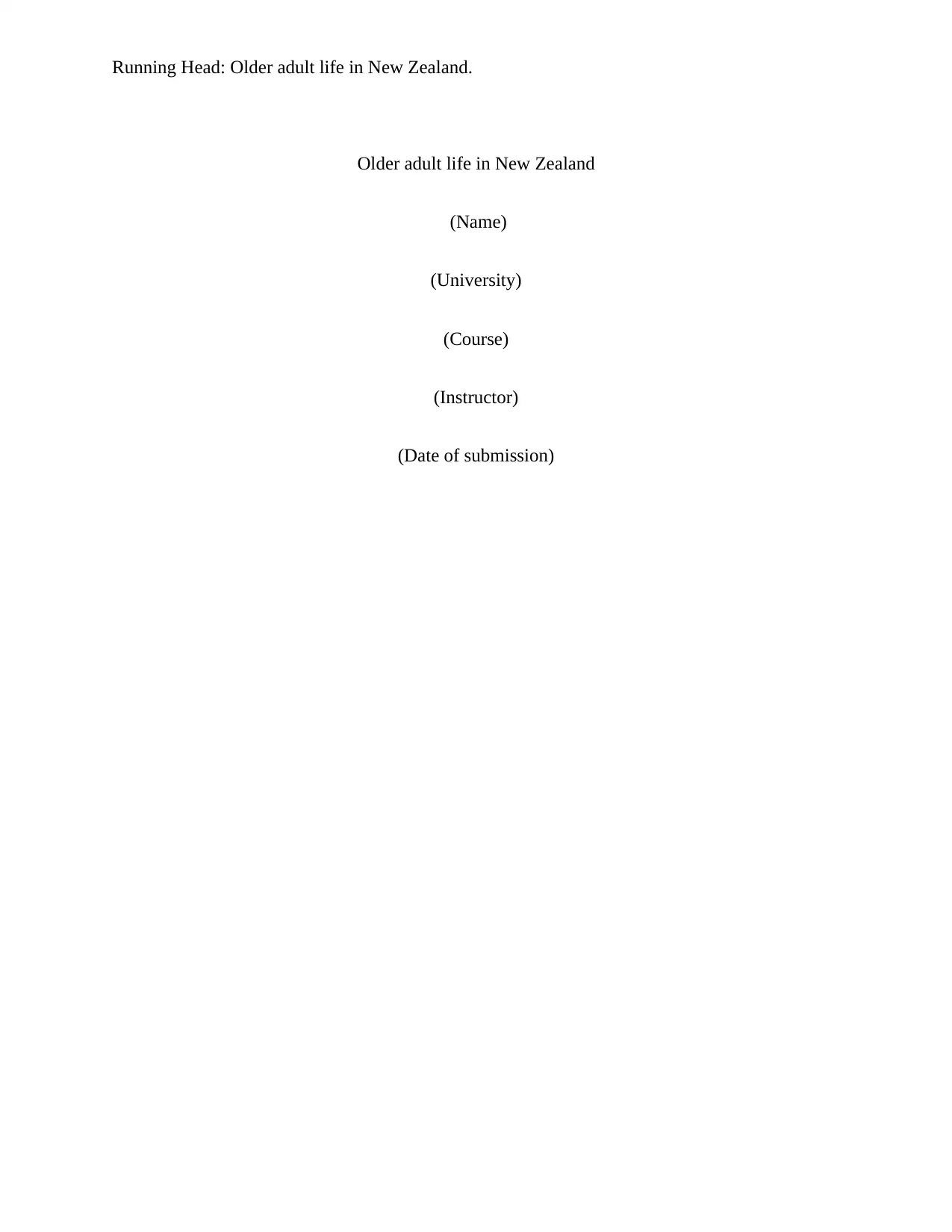
Running Head: Older adult life in New Zealand.
Older adult life in New Zealand
(Name)
(University)
(Course)
(Instructor)
(Date of submission)
Older adult life in New Zealand
(Name)
(University)
(Course)
(Instructor)
(Date of submission)
Paraphrase This Document
Need a fresh take? Get an instant paraphrase of this document with our AI Paraphraser
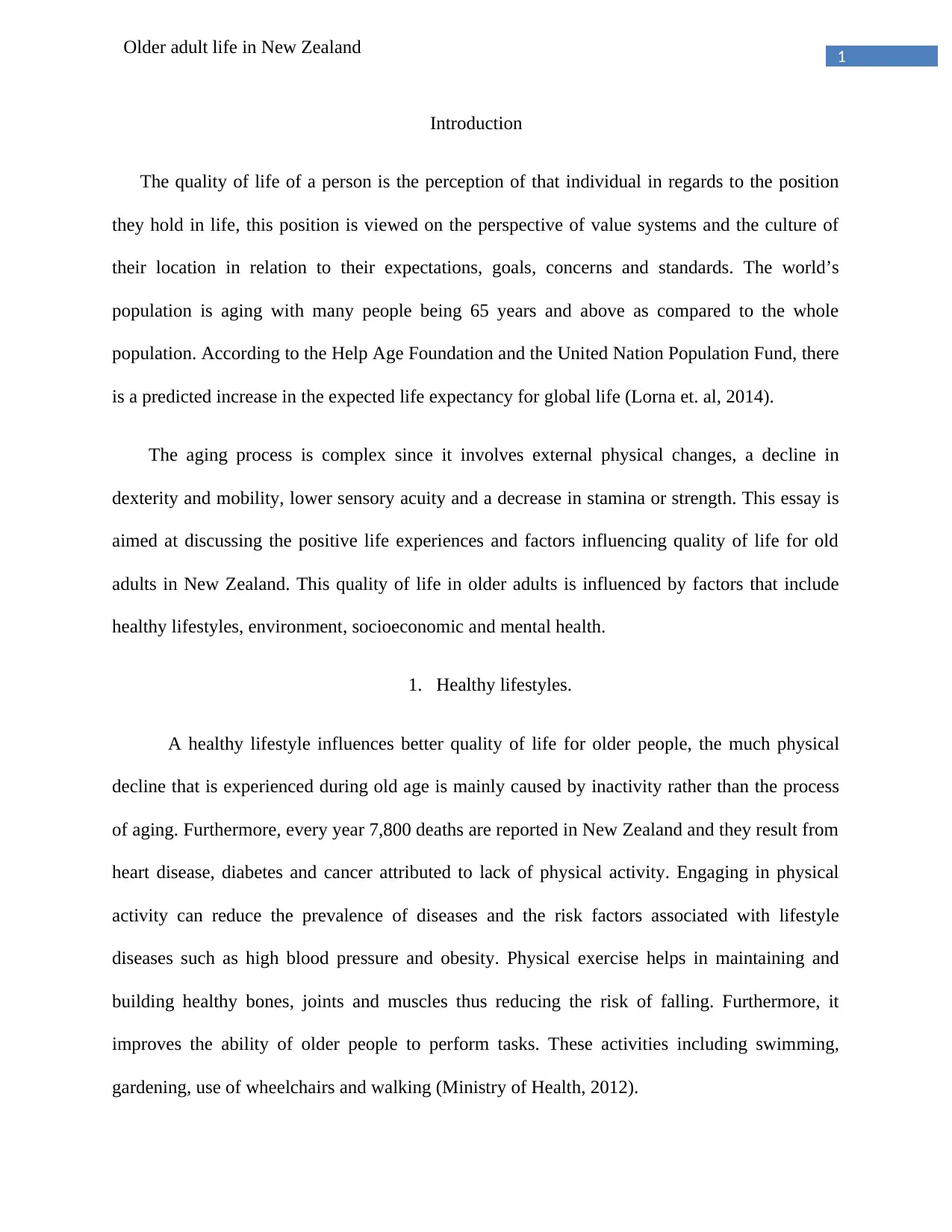
1Older adult life in New Zealand
Introduction
The quality of life of a person is the perception of that individual in regards to the position
they hold in life, this position is viewed on the perspective of value systems and the culture of
their location in relation to their expectations, goals, concerns and standards. The world’s
population is aging with many people being 65 years and above as compared to the whole
population. According to the Help Age Foundation and the United Nation Population Fund, there
is a predicted increase in the expected life expectancy for global life (Lorna et. al, 2014).
The aging process is complex since it involves external physical changes, a decline in
dexterity and mobility, lower sensory acuity and a decrease in stamina or strength. This essay is
aimed at discussing the positive life experiences and factors influencing quality of life for old
adults in New Zealand. This quality of life in older adults is influenced by factors that include
healthy lifestyles, environment, socioeconomic and mental health.
1. Healthy lifestyles.
A healthy lifestyle influences better quality of life for older people, the much physical
decline that is experienced during old age is mainly caused by inactivity rather than the process
of aging. Furthermore, every year 7,800 deaths are reported in New Zealand and they result from
heart disease, diabetes and cancer attributed to lack of physical activity. Engaging in physical
activity can reduce the prevalence of diseases and the risk factors associated with lifestyle
diseases such as high blood pressure and obesity. Physical exercise helps in maintaining and
building healthy bones, joints and muscles thus reducing the risk of falling. Furthermore, it
improves the ability of older people to perform tasks. These activities including swimming,
gardening, use of wheelchairs and walking (Ministry of Health, 2012).
Introduction
The quality of life of a person is the perception of that individual in regards to the position
they hold in life, this position is viewed on the perspective of value systems and the culture of
their location in relation to their expectations, goals, concerns and standards. The world’s
population is aging with many people being 65 years and above as compared to the whole
population. According to the Help Age Foundation and the United Nation Population Fund, there
is a predicted increase in the expected life expectancy for global life (Lorna et. al, 2014).
The aging process is complex since it involves external physical changes, a decline in
dexterity and mobility, lower sensory acuity and a decrease in stamina or strength. This essay is
aimed at discussing the positive life experiences and factors influencing quality of life for old
adults in New Zealand. This quality of life in older adults is influenced by factors that include
healthy lifestyles, environment, socioeconomic and mental health.
1. Healthy lifestyles.
A healthy lifestyle influences better quality of life for older people, the much physical
decline that is experienced during old age is mainly caused by inactivity rather than the process
of aging. Furthermore, every year 7,800 deaths are reported in New Zealand and they result from
heart disease, diabetes and cancer attributed to lack of physical activity. Engaging in physical
activity can reduce the prevalence of diseases and the risk factors associated with lifestyle
diseases such as high blood pressure and obesity. Physical exercise helps in maintaining and
building healthy bones, joints and muscles thus reducing the risk of falling. Furthermore, it
improves the ability of older people to perform tasks. These activities including swimming,
gardening, use of wheelchairs and walking (Ministry of Health, 2012).
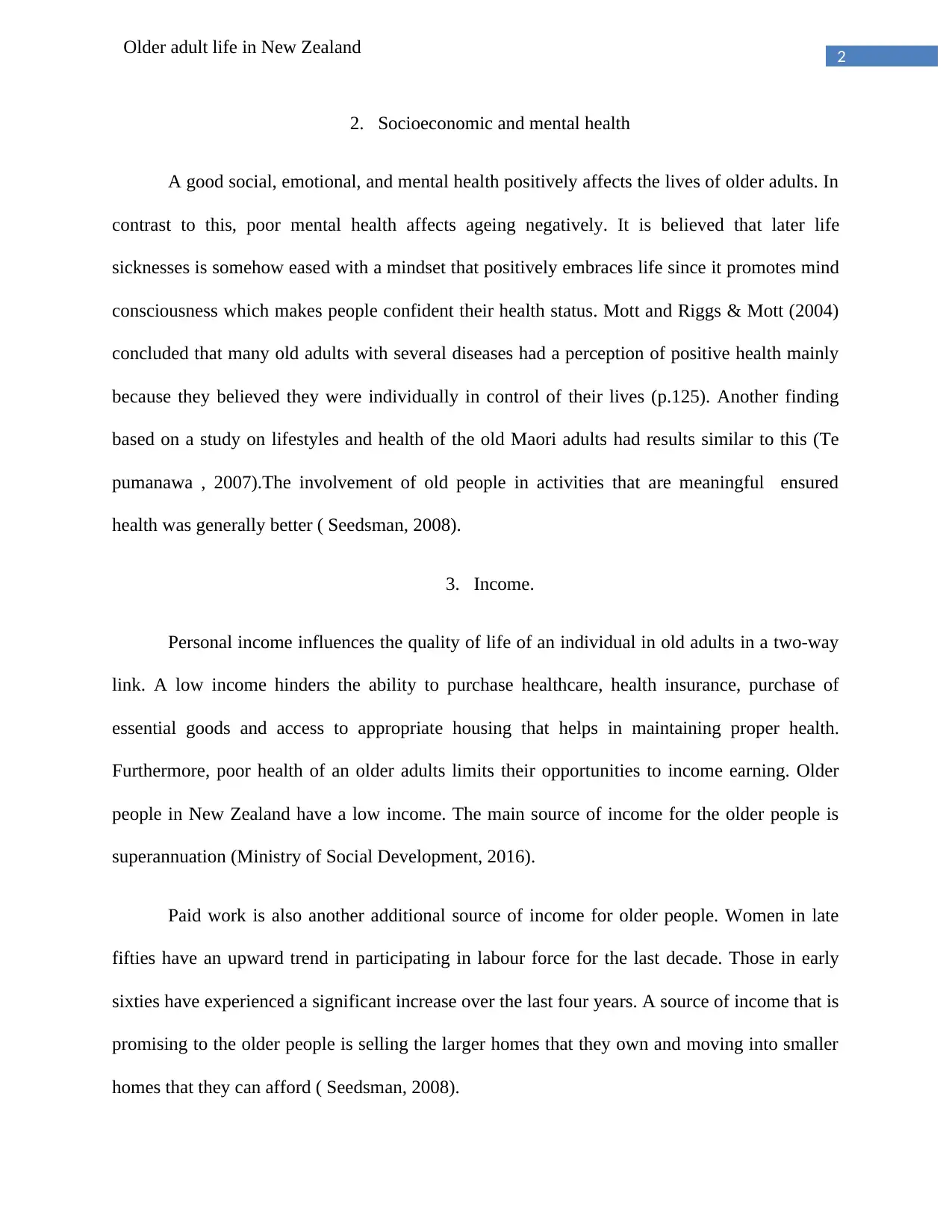
2Older adult life in New Zealand
2. Socioeconomic and mental health
A good social, emotional, and mental health positively affects the lives of older adults. In
contrast to this, poor mental health affects ageing negatively. It is believed that later life
sicknesses is somehow eased with a mindset that positively embraces life since it promotes mind
consciousness which makes people confident their health status. Mott and Riggs & Mott (2004)
concluded that many old adults with several diseases had a perception of positive health mainly
because they believed they were individually in control of their lives (p.125). Another finding
based on a study on lifestyles and health of the old Maori adults had results similar to this (Te
pumanawa , 2007).The involvement of old people in activities that are meaningful ensured
health was generally better ( Seedsman, 2008).
3. Income.
Personal income influences the quality of life of an individual in old adults in a two-way
link. A low income hinders the ability to purchase healthcare, health insurance, purchase of
essential goods and access to appropriate housing that helps in maintaining proper health.
Furthermore, poor health of an older adults limits their opportunities to income earning. Older
people in New Zealand have a low income. The main source of income for the older people is
superannuation (Ministry of Social Development, 2016).
Paid work is also another additional source of income for older people. Women in late
fifties have an upward trend in participating in labour force for the last decade. Those in early
sixties have experienced a significant increase over the last four years. A source of income that is
promising to the older people is selling the larger homes that they own and moving into smaller
homes that they can afford ( Seedsman, 2008).
2. Socioeconomic and mental health
A good social, emotional, and mental health positively affects the lives of older adults. In
contrast to this, poor mental health affects ageing negatively. It is believed that later life
sicknesses is somehow eased with a mindset that positively embraces life since it promotes mind
consciousness which makes people confident their health status. Mott and Riggs & Mott (2004)
concluded that many old adults with several diseases had a perception of positive health mainly
because they believed they were individually in control of their lives (p.125). Another finding
based on a study on lifestyles and health of the old Maori adults had results similar to this (Te
pumanawa , 2007).The involvement of old people in activities that are meaningful ensured
health was generally better ( Seedsman, 2008).
3. Income.
Personal income influences the quality of life of an individual in old adults in a two-way
link. A low income hinders the ability to purchase healthcare, health insurance, purchase of
essential goods and access to appropriate housing that helps in maintaining proper health.
Furthermore, poor health of an older adults limits their opportunities to income earning. Older
people in New Zealand have a low income. The main source of income for the older people is
superannuation (Ministry of Social Development, 2016).
Paid work is also another additional source of income for older people. Women in late
fifties have an upward trend in participating in labour force for the last decade. Those in early
sixties have experienced a significant increase over the last four years. A source of income that is
promising to the older people is selling the larger homes that they own and moving into smaller
homes that they can afford ( Seedsman, 2008).
⊘ This is a preview!⊘
Do you want full access?
Subscribe today to unlock all pages.

Trusted by 1+ million students worldwide
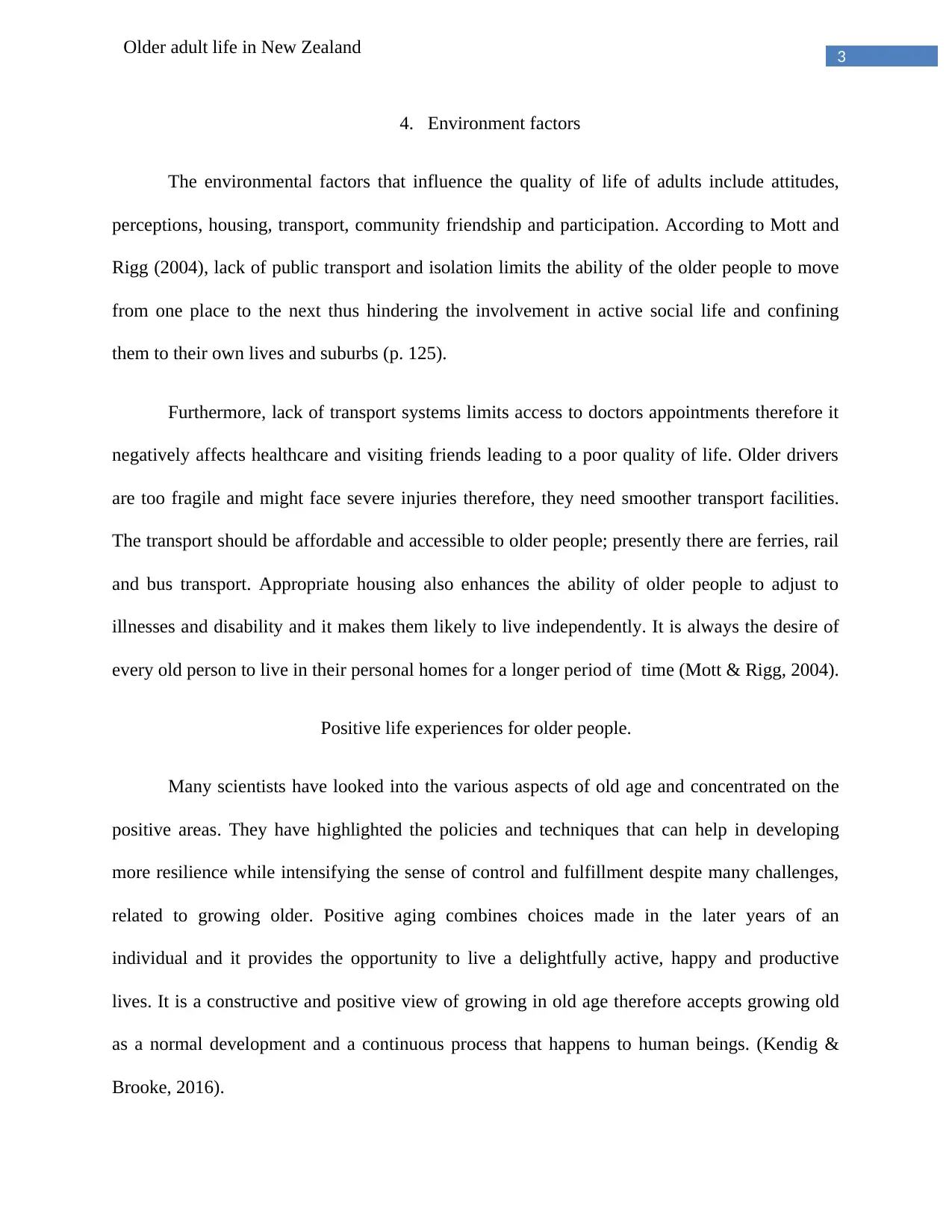
3Older adult life in New Zealand
4. Environment factors
The environmental factors that influence the quality of life of adults include attitudes,
perceptions, housing, transport, community friendship and participation. According to Mott and
Rigg (2004), lack of public transport and isolation limits the ability of the older people to move
from one place to the next thus hindering the involvement in active social life and confining
them to their own lives and suburbs (p. 125).
Furthermore, lack of transport systems limits access to doctors appointments therefore it
negatively affects healthcare and visiting friends leading to a poor quality of life. Older drivers
are too fragile and might face severe injuries therefore, they need smoother transport facilities.
The transport should be affordable and accessible to older people; presently there are ferries, rail
and bus transport. Appropriate housing also enhances the ability of older people to adjust to
illnesses and disability and it makes them likely to live independently. It is always the desire of
every old person to live in their personal homes for a longer period of time (Mott & Rigg, 2004).
Positive life experiences for older people.
Many scientists have looked into the various aspects of old age and concentrated on the
positive areas. They have highlighted the policies and techniques that can help in developing
more resilience while intensifying the sense of control and fulfillment despite many challenges,
related to growing older. Positive aging combines choices made in the later years of an
individual and it provides the opportunity to live a delightfully active, happy and productive
lives. It is a constructive and positive view of growing in old age therefore accepts growing old
as a normal development and a continuous process that happens to human beings. (Kendig &
Brooke, 2016).
4. Environment factors
The environmental factors that influence the quality of life of adults include attitudes,
perceptions, housing, transport, community friendship and participation. According to Mott and
Rigg (2004), lack of public transport and isolation limits the ability of the older people to move
from one place to the next thus hindering the involvement in active social life and confining
them to their own lives and suburbs (p. 125).
Furthermore, lack of transport systems limits access to doctors appointments therefore it
negatively affects healthcare and visiting friends leading to a poor quality of life. Older drivers
are too fragile and might face severe injuries therefore, they need smoother transport facilities.
The transport should be affordable and accessible to older people; presently there are ferries, rail
and bus transport. Appropriate housing also enhances the ability of older people to adjust to
illnesses and disability and it makes them likely to live independently. It is always the desire of
every old person to live in their personal homes for a longer period of time (Mott & Rigg, 2004).
Positive life experiences for older people.
Many scientists have looked into the various aspects of old age and concentrated on the
positive areas. They have highlighted the policies and techniques that can help in developing
more resilience while intensifying the sense of control and fulfillment despite many challenges,
related to growing older. Positive aging combines choices made in the later years of an
individual and it provides the opportunity to live a delightfully active, happy and productive
lives. It is a constructive and positive view of growing in old age therefore accepts growing old
as a normal development and a continuous process that happens to human beings. (Kendig &
Brooke, 2016).
Paraphrase This Document
Need a fresh take? Get an instant paraphrase of this document with our AI Paraphraser
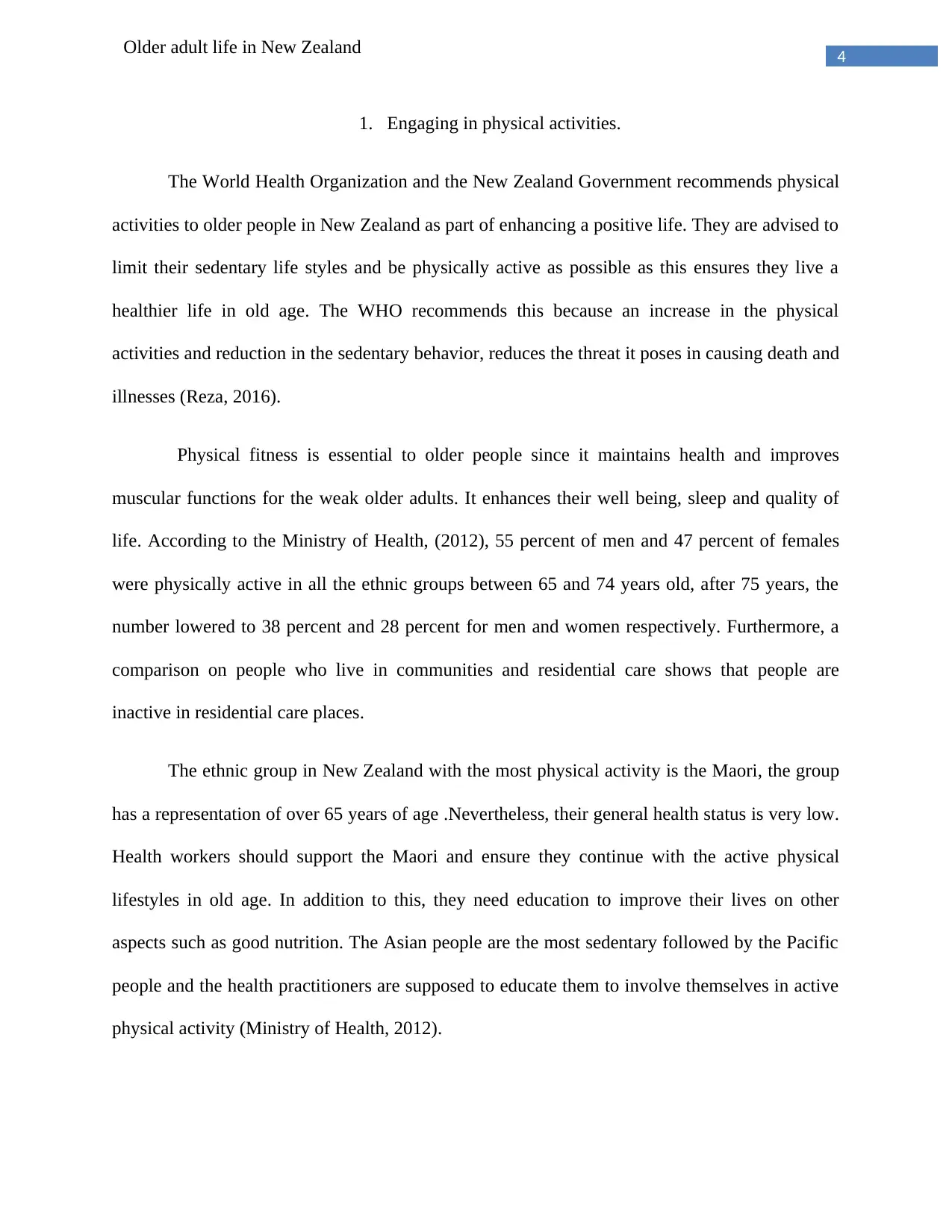
4Older adult life in New Zealand
1. Engaging in physical activities.
The World Health Organization and the New Zealand Government recommends physical
activities to older people in New Zealand as part of enhancing a positive life. They are advised to
limit their sedentary life styles and be physically active as possible as this ensures they live a
healthier life in old age. The WHO recommends this because an increase in the physical
activities and reduction in the sedentary behavior, reduces the threat it poses in causing death and
illnesses (Reza, 2016).
Physical fitness is essential to older people since it maintains health and improves
muscular functions for the weak older adults. It enhances their well being, sleep and quality of
life. According to the Ministry of Health, (2012), 55 percent of men and 47 percent of females
were physically active in all the ethnic groups between 65 and 74 years old, after 75 years, the
number lowered to 38 percent and 28 percent for men and women respectively. Furthermore, a
comparison on people who live in communities and residential care shows that people are
inactive in residential care places.
The ethnic group in New Zealand with the most physical activity is the Maori, the group
has a representation of over 65 years of age .Nevertheless, their general health status is very low.
Health workers should support the Maori and ensure they continue with the active physical
lifestyles in old age. In addition to this, they need education to improve their lives on other
aspects such as good nutrition. The Asian people are the most sedentary followed by the Pacific
people and the health practitioners are supposed to educate them to involve themselves in active
physical activity (Ministry of Health, 2012).
1. Engaging in physical activities.
The World Health Organization and the New Zealand Government recommends physical
activities to older people in New Zealand as part of enhancing a positive life. They are advised to
limit their sedentary life styles and be physically active as possible as this ensures they live a
healthier life in old age. The WHO recommends this because an increase in the physical
activities and reduction in the sedentary behavior, reduces the threat it poses in causing death and
illnesses (Reza, 2016).
Physical fitness is essential to older people since it maintains health and improves
muscular functions for the weak older adults. It enhances their well being, sleep and quality of
life. According to the Ministry of Health, (2012), 55 percent of men and 47 percent of females
were physically active in all the ethnic groups between 65 and 74 years old, after 75 years, the
number lowered to 38 percent and 28 percent for men and women respectively. Furthermore, a
comparison on people who live in communities and residential care shows that people are
inactive in residential care places.
The ethnic group in New Zealand with the most physical activity is the Maori, the group
has a representation of over 65 years of age .Nevertheless, their general health status is very low.
Health workers should support the Maori and ensure they continue with the active physical
lifestyles in old age. In addition to this, they need education to improve their lives on other
aspects such as good nutrition. The Asian people are the most sedentary followed by the Pacific
people and the health practitioners are supposed to educate them to involve themselves in active
physical activity (Ministry of Health, 2012).
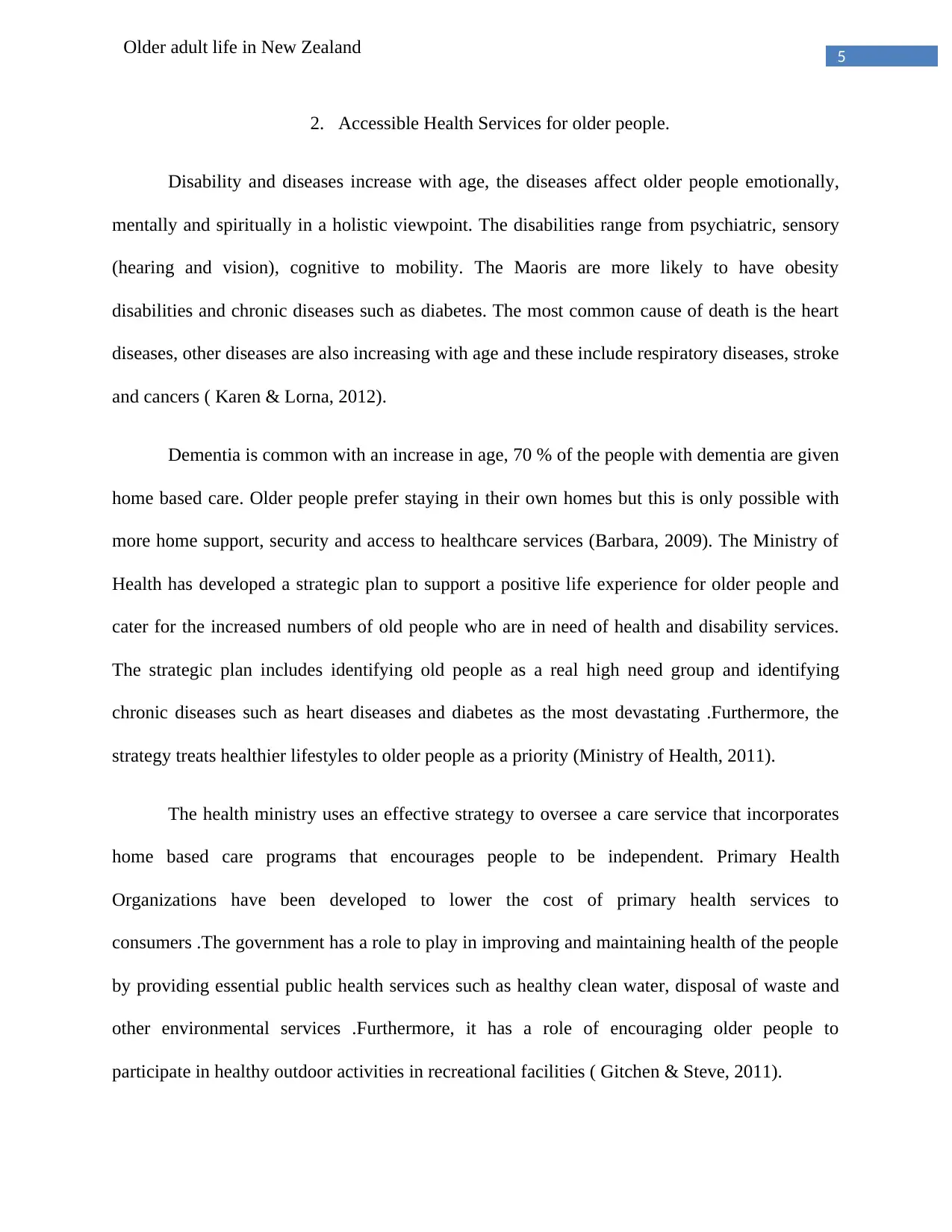
5Older adult life in New Zealand
2. Accessible Health Services for older people.
Disability and diseases increase with age, the diseases affect older people emotionally,
mentally and spiritually in a holistic viewpoint. The disabilities range from psychiatric, sensory
(hearing and vision), cognitive to mobility. The Maoris are more likely to have obesity
disabilities and chronic diseases such as diabetes. The most common cause of death is the heart
diseases, other diseases are also increasing with age and these include respiratory diseases, stroke
and cancers ( Karen & Lorna, 2012).
Dementia is common with an increase in age, 70 % of the people with dementia are given
home based care. Older people prefer staying in their own homes but this is only possible with
more home support, security and access to healthcare services (Barbara, 2009). The Ministry of
Health has developed a strategic plan to support a positive life experience for older people and
cater for the increased numbers of old people who are in need of health and disability services.
The strategic plan includes identifying old people as a real high need group and identifying
chronic diseases such as heart diseases and diabetes as the most devastating .Furthermore, the
strategy treats healthier lifestyles to older people as a priority (Ministry of Health, 2011).
The health ministry uses an effective strategy to oversee a care service that incorporates
home based care programs that encourages people to be independent. Primary Health
Organizations have been developed to lower the cost of primary health services to
consumers .The government has a role to play in improving and maintaining health of the people
by providing essential public health services such as healthy clean water, disposal of waste and
other environmental services .Furthermore, it has a role of encouraging older people to
participate in healthy outdoor activities in recreational facilities ( Gitchen & Steve, 2011).
2. Accessible Health Services for older people.
Disability and diseases increase with age, the diseases affect older people emotionally,
mentally and spiritually in a holistic viewpoint. The disabilities range from psychiatric, sensory
(hearing and vision), cognitive to mobility. The Maoris are more likely to have obesity
disabilities and chronic diseases such as diabetes. The most common cause of death is the heart
diseases, other diseases are also increasing with age and these include respiratory diseases, stroke
and cancers ( Karen & Lorna, 2012).
Dementia is common with an increase in age, 70 % of the people with dementia are given
home based care. Older people prefer staying in their own homes but this is only possible with
more home support, security and access to healthcare services (Barbara, 2009). The Ministry of
Health has developed a strategic plan to support a positive life experience for older people and
cater for the increased numbers of old people who are in need of health and disability services.
The strategic plan includes identifying old people as a real high need group and identifying
chronic diseases such as heart diseases and diabetes as the most devastating .Furthermore, the
strategy treats healthier lifestyles to older people as a priority (Ministry of Health, 2011).
The health ministry uses an effective strategy to oversee a care service that incorporates
home based care programs that encourages people to be independent. Primary Health
Organizations have been developed to lower the cost of primary health services to
consumers .The government has a role to play in improving and maintaining health of the people
by providing essential public health services such as healthy clean water, disposal of waste and
other environmental services .Furthermore, it has a role of encouraging older people to
participate in healthy outdoor activities in recreational facilities ( Gitchen & Steve, 2011).
⊘ This is a preview!⊘
Do you want full access?
Subscribe today to unlock all pages.

Trusted by 1+ million students worldwide
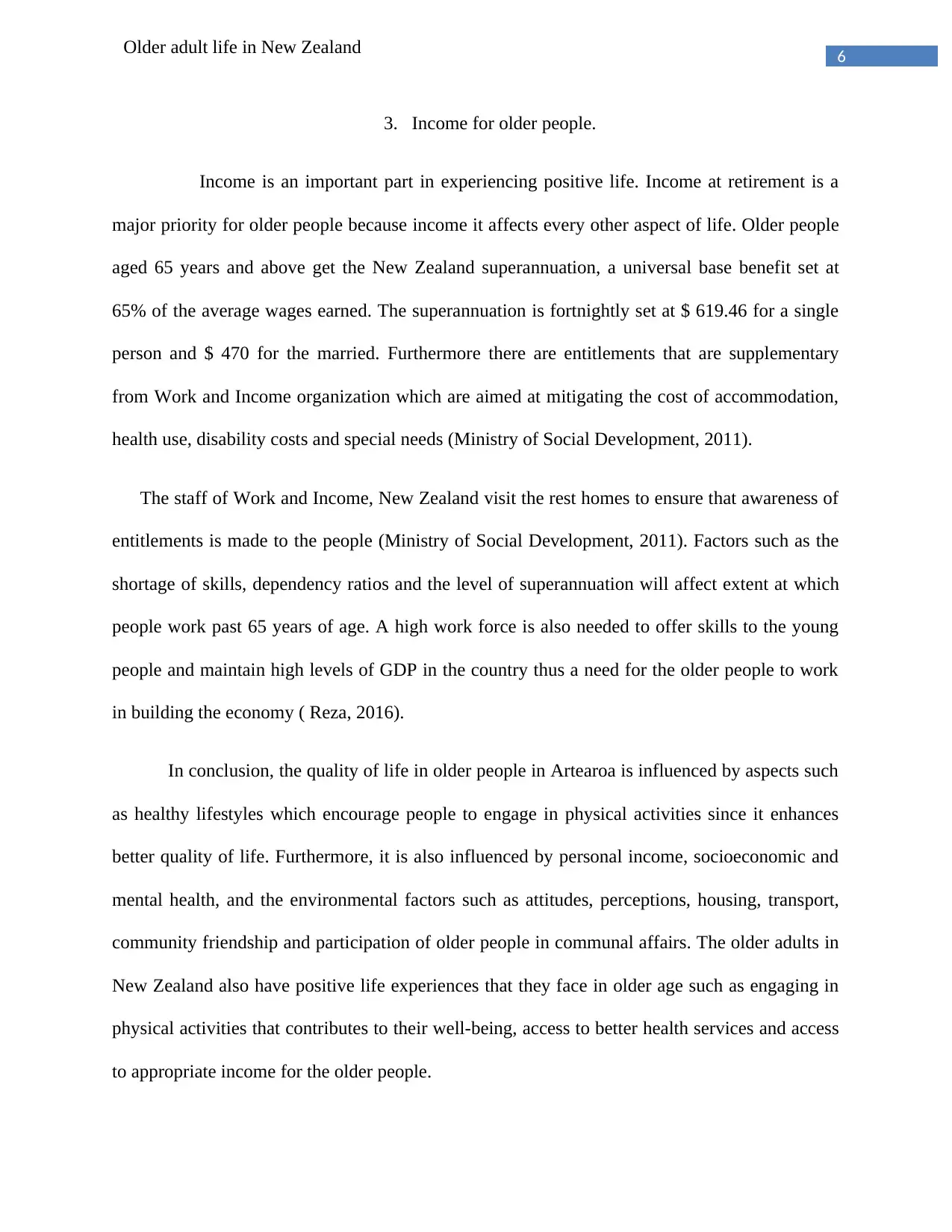
6Older adult life in New Zealand
3. Income for older people.
Income is an important part in experiencing positive life. Income at retirement is a
major priority for older people because income it affects every other aspect of life. Older people
aged 65 years and above get the New Zealand superannuation, a universal base benefit set at
65% of the average wages earned. The superannuation is fortnightly set at $ 619.46 for a single
person and $ 470 for the married. Furthermore there are entitlements that are supplementary
from Work and Income organization which are aimed at mitigating the cost of accommodation,
health use, disability costs and special needs (Ministry of Social Development, 2011).
The staff of Work and Income, New Zealand visit the rest homes to ensure that awareness of
entitlements is made to the people (Ministry of Social Development, 2011). Factors such as the
shortage of skills, dependency ratios and the level of superannuation will affect extent at which
people work past 65 years of age. A high work force is also needed to offer skills to the young
people and maintain high levels of GDP in the country thus a need for the older people to work
in building the economy ( Reza, 2016).
In conclusion, the quality of life in older people in Artearoa is influenced by aspects such
as healthy lifestyles which encourage people to engage in physical activities since it enhances
better quality of life. Furthermore, it is also influenced by personal income, socioeconomic and
mental health, and the environmental factors such as attitudes, perceptions, housing, transport,
community friendship and participation of older people in communal affairs. The older adults in
New Zealand also have positive life experiences that they face in older age such as engaging in
physical activities that contributes to their well-being, access to better health services and access
to appropriate income for the older people.
3. Income for older people.
Income is an important part in experiencing positive life. Income at retirement is a
major priority for older people because income it affects every other aspect of life. Older people
aged 65 years and above get the New Zealand superannuation, a universal base benefit set at
65% of the average wages earned. The superannuation is fortnightly set at $ 619.46 for a single
person and $ 470 for the married. Furthermore there are entitlements that are supplementary
from Work and Income organization which are aimed at mitigating the cost of accommodation,
health use, disability costs and special needs (Ministry of Social Development, 2011).
The staff of Work and Income, New Zealand visit the rest homes to ensure that awareness of
entitlements is made to the people (Ministry of Social Development, 2011). Factors such as the
shortage of skills, dependency ratios and the level of superannuation will affect extent at which
people work past 65 years of age. A high work force is also needed to offer skills to the young
people and maintain high levels of GDP in the country thus a need for the older people to work
in building the economy ( Reza, 2016).
In conclusion, the quality of life in older people in Artearoa is influenced by aspects such
as healthy lifestyles which encourage people to engage in physical activities since it enhances
better quality of life. Furthermore, it is also influenced by personal income, socioeconomic and
mental health, and the environmental factors such as attitudes, perceptions, housing, transport,
community friendship and participation of older people in communal affairs. The older adults in
New Zealand also have positive life experiences that they face in older age such as engaging in
physical activities that contributes to their well-being, access to better health services and access
to appropriate income for the older people.
Paraphrase This Document
Need a fresh take? Get an instant paraphrase of this document with our AI Paraphraser
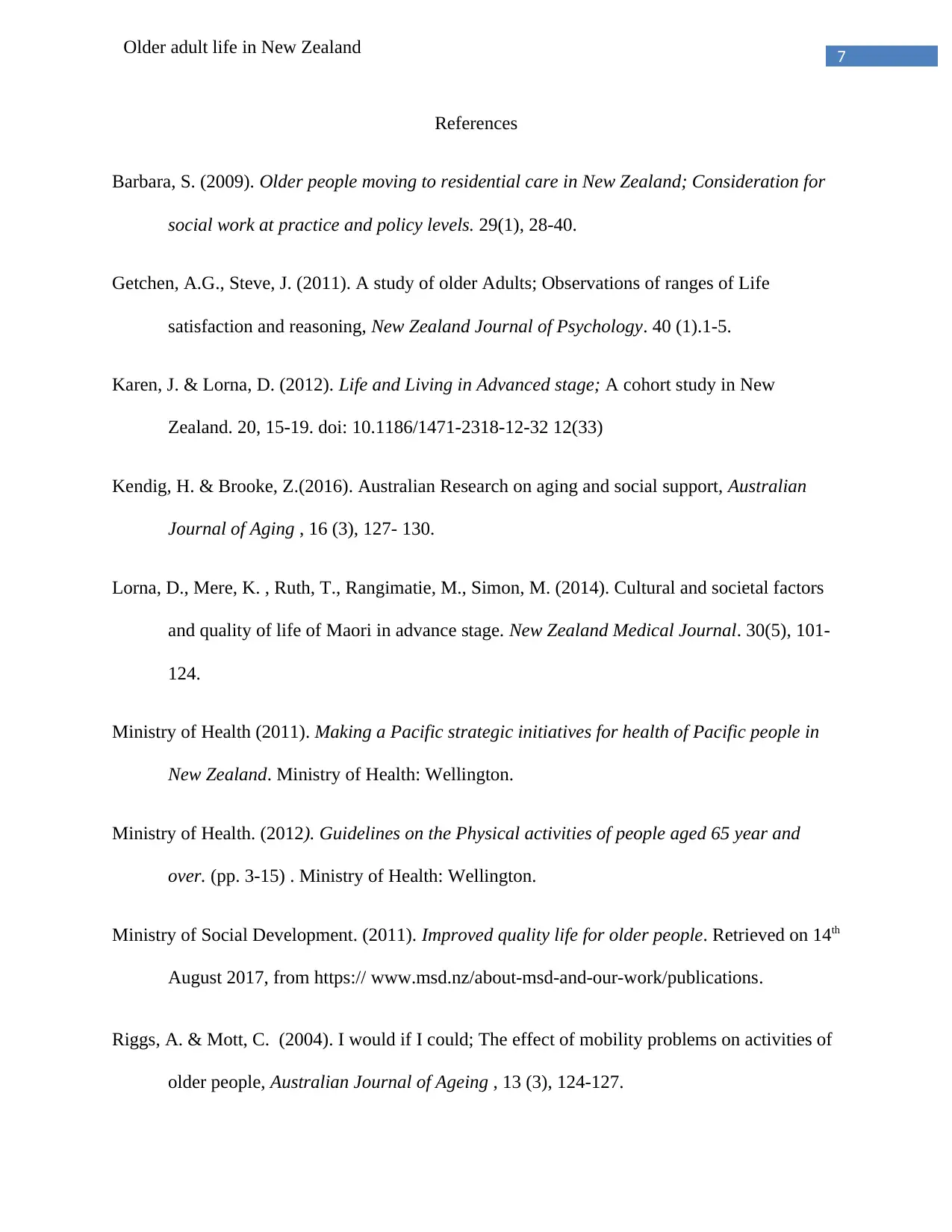
7Older adult life in New Zealand
References
Barbara, S. (2009). Older people moving to residential care in New Zealand; Consideration for
social work at practice and policy levels. 29(1), 28-40.
Getchen, A.G., Steve, J. (2011). A study of older Adults; Observations of ranges of Life
satisfaction and reasoning, New Zealand Journal of Psychology. 40 (1).1-5.
Karen, J. & Lorna, D. (2012). Life and Living in Advanced stage; A cohort study in New
Zealand. 20, 15-19. doi: 10.1186/1471-2318-12-32 12(33)
Kendig, H. & Brooke, Z.(2016). Australian Research on aging and social support, Australian
Journal of Aging , 16 (3), 127- 130.
Lorna, D., Mere, K. , Ruth, T., Rangimatie, M., Simon, M. (2014). Cultural and societal factors
and quality of life of Maori in advance stage. New Zealand Medical Journal. 30(5), 101-
124.
Ministry of Health (2011). Making a Pacific strategic initiatives for health of Pacific people in
New Zealand. Ministry of Health: Wellington.
Ministry of Health. (2012). Guidelines on the Physical activities of people aged 65 year and
over. (pp. 3-15) . Ministry of Health: Wellington.
Ministry of Social Development. (2011). Improved quality life for older people. Retrieved on 14th
August 2017, from https:// www.msd.nz/about-msd-and-our-work/publications.
Riggs, A. & Mott, C. (2004). I would if I could; The effect of mobility problems on activities of
older people, Australian Journal of Ageing , 13 (3), 124-127.
References
Barbara, S. (2009). Older people moving to residential care in New Zealand; Consideration for
social work at practice and policy levels. 29(1), 28-40.
Getchen, A.G., Steve, J. (2011). A study of older Adults; Observations of ranges of Life
satisfaction and reasoning, New Zealand Journal of Psychology. 40 (1).1-5.
Karen, J. & Lorna, D. (2012). Life and Living in Advanced stage; A cohort study in New
Zealand. 20, 15-19. doi: 10.1186/1471-2318-12-32 12(33)
Kendig, H. & Brooke, Z.(2016). Australian Research on aging and social support, Australian
Journal of Aging , 16 (3), 127- 130.
Lorna, D., Mere, K. , Ruth, T., Rangimatie, M., Simon, M. (2014). Cultural and societal factors
and quality of life of Maori in advance stage. New Zealand Medical Journal. 30(5), 101-
124.
Ministry of Health (2011). Making a Pacific strategic initiatives for health of Pacific people in
New Zealand. Ministry of Health: Wellington.
Ministry of Health. (2012). Guidelines on the Physical activities of people aged 65 year and
over. (pp. 3-15) . Ministry of Health: Wellington.
Ministry of Social Development. (2011). Improved quality life for older people. Retrieved on 14th
August 2017, from https:// www.msd.nz/about-msd-and-our-work/publications.
Riggs, A. & Mott, C. (2004). I would if I could; The effect of mobility problems on activities of
older people, Australian Journal of Ageing , 13 (3), 124-127.
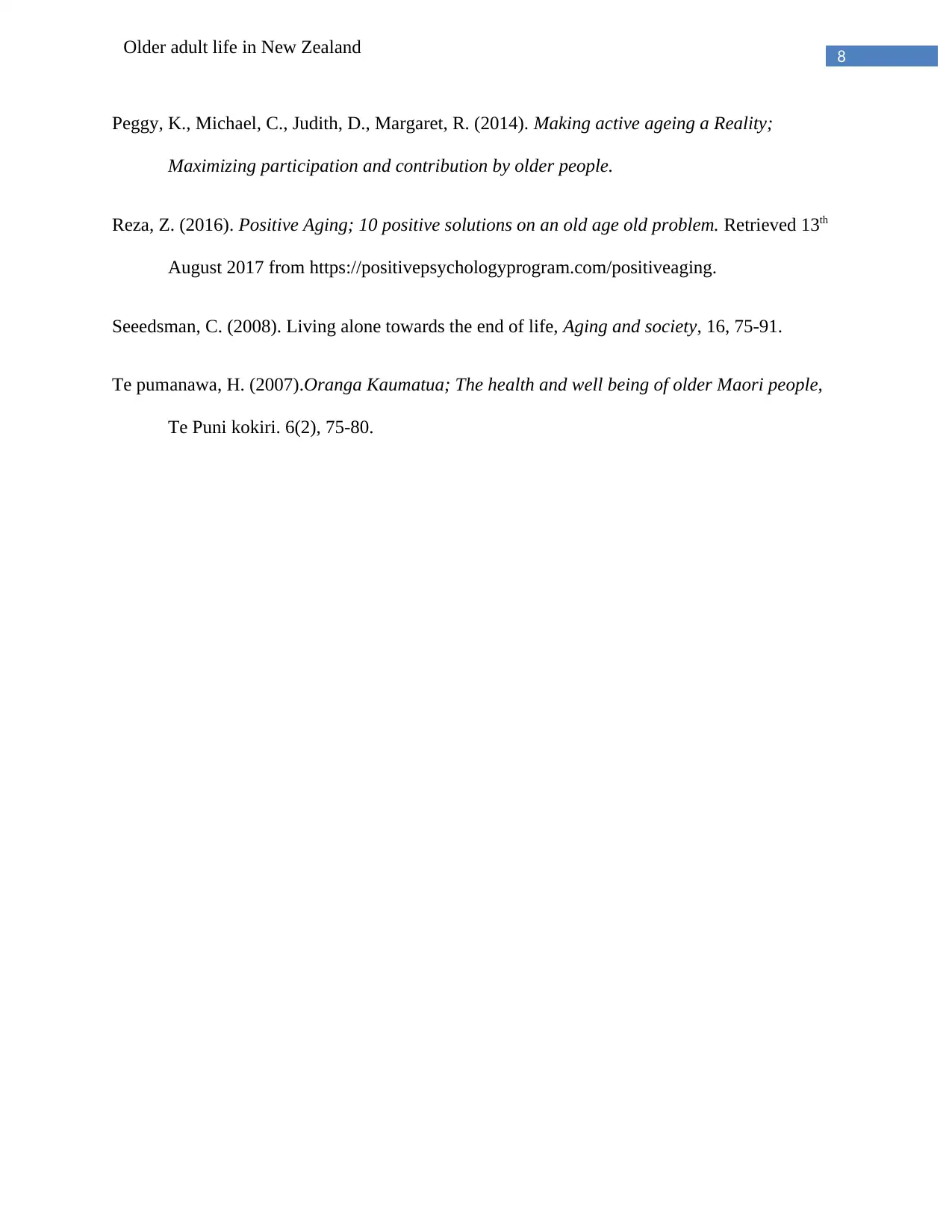
8Older adult life in New Zealand
Peggy, K., Michael, C., Judith, D., Margaret, R. (2014). Making active ageing a Reality;
Maximizing participation and contribution by older people.
Reza, Z. (2016). Positive Aging; 10 positive solutions on an old age old problem. Retrieved 13th
August 2017 from https://positivepsychologyprogram.com/positiveaging.
Seeedsman, C. (2008). Living alone towards the end of life, Aging and society, 16, 75-91.
Te pumanawa, H. (2007).Oranga Kaumatua; The health and well being of older Maori people,
Te Puni kokiri. 6(2), 75-80.
Peggy, K., Michael, C., Judith, D., Margaret, R. (2014). Making active ageing a Reality;
Maximizing participation and contribution by older people.
Reza, Z. (2016). Positive Aging; 10 positive solutions on an old age old problem. Retrieved 13th
August 2017 from https://positivepsychologyprogram.com/positiveaging.
Seeedsman, C. (2008). Living alone towards the end of life, Aging and society, 16, 75-91.
Te pumanawa, H. (2007).Oranga Kaumatua; The health and well being of older Maori people,
Te Puni kokiri. 6(2), 75-80.
⊘ This is a preview!⊘
Do you want full access?
Subscribe today to unlock all pages.

Trusted by 1+ million students worldwide
1 out of 9
Related Documents
Your All-in-One AI-Powered Toolkit for Academic Success.
+13062052269
info@desklib.com
Available 24*7 on WhatsApp / Email
![[object Object]](/_next/static/media/star-bottom.7253800d.svg)
Unlock your academic potential
Copyright © 2020–2026 A2Z Services. All Rights Reserved. Developed and managed by ZUCOL.




